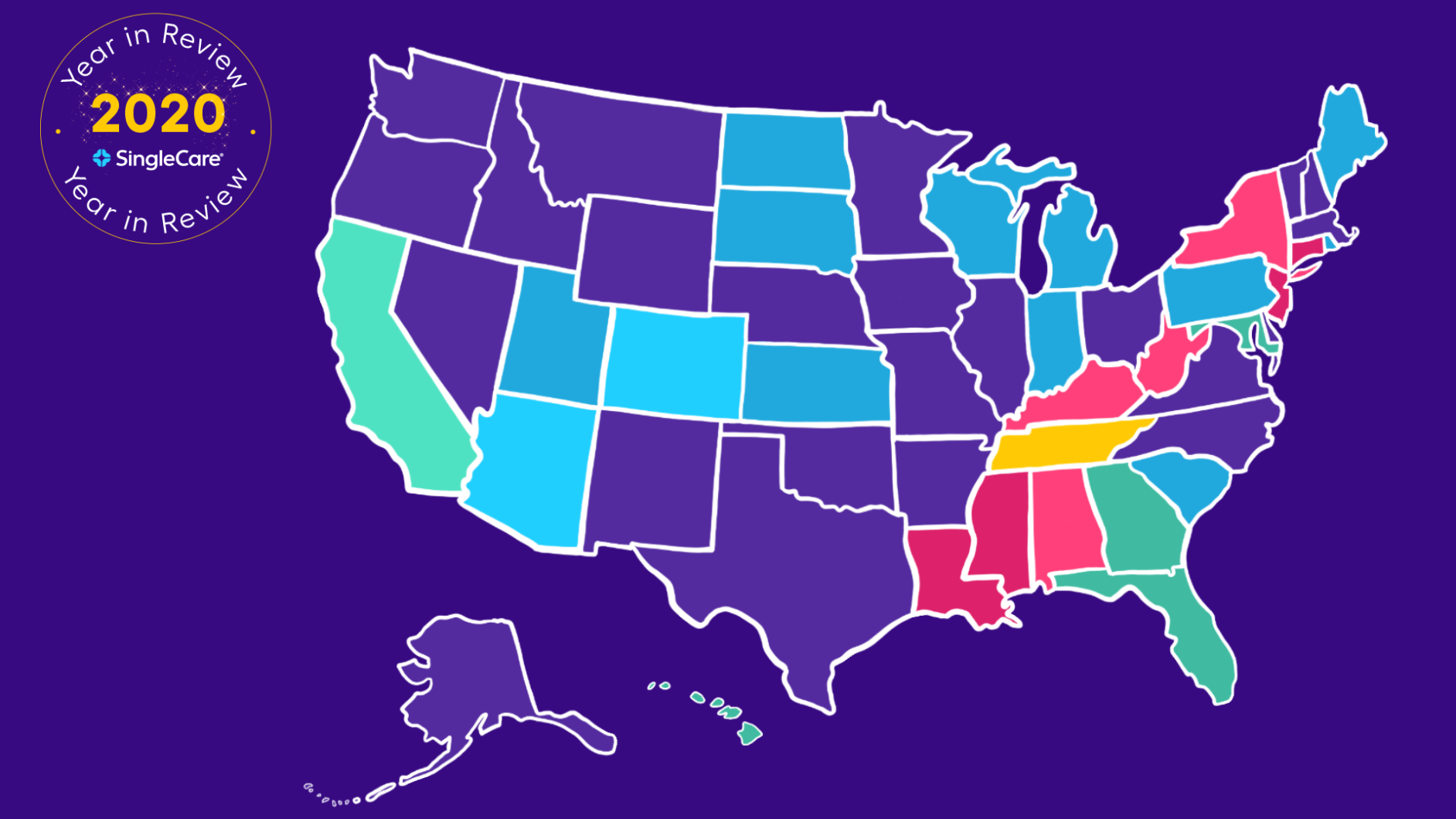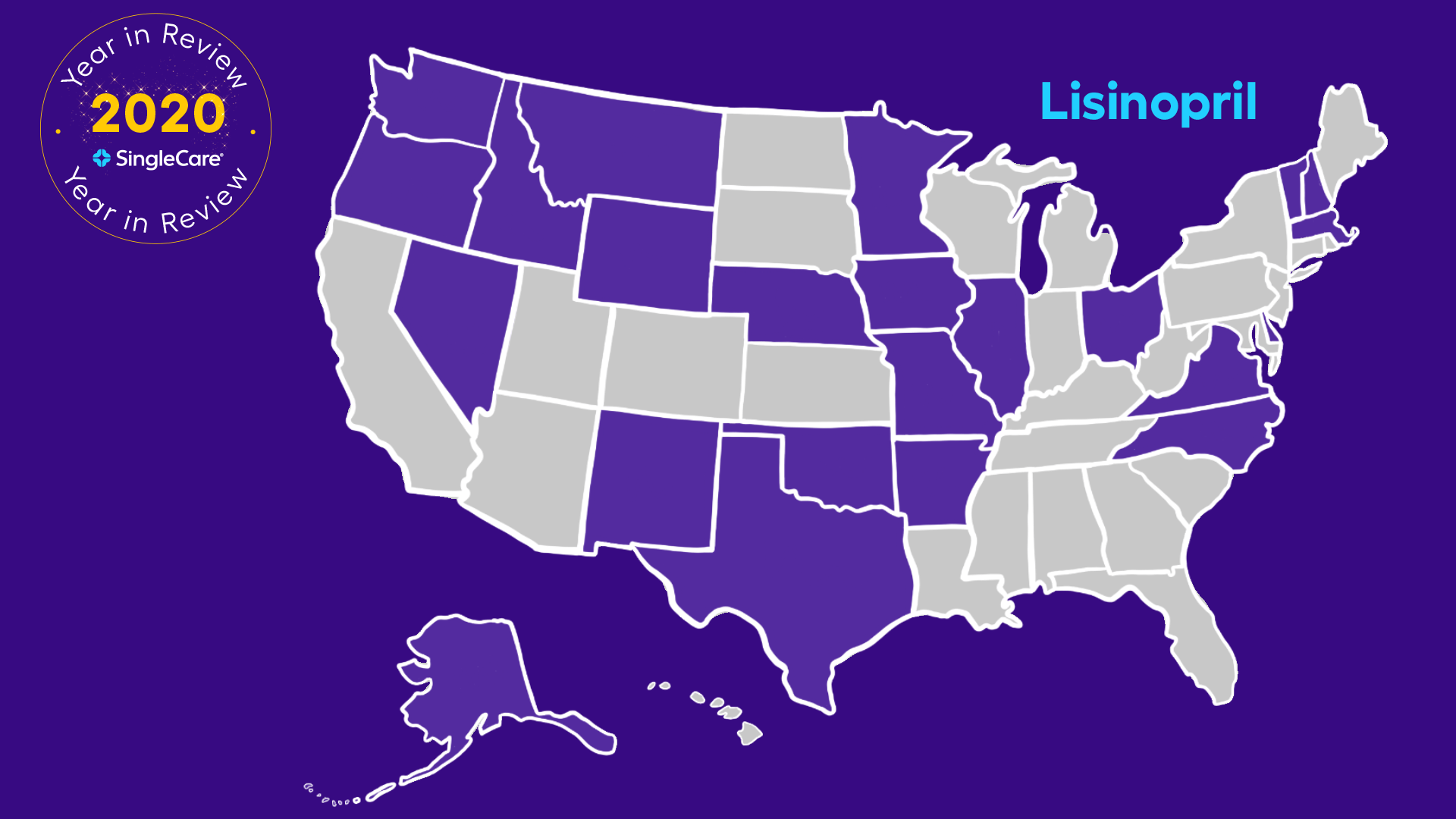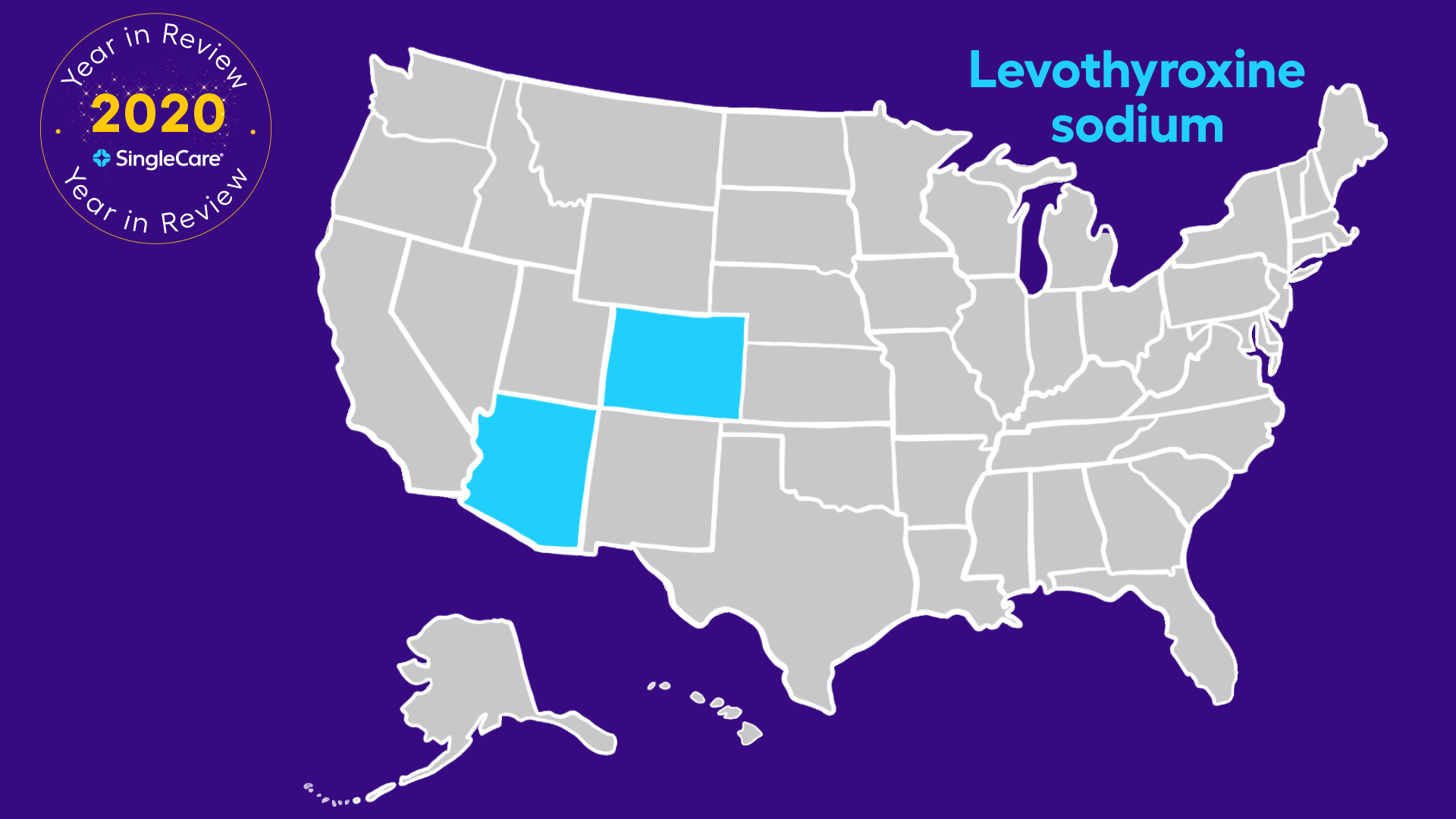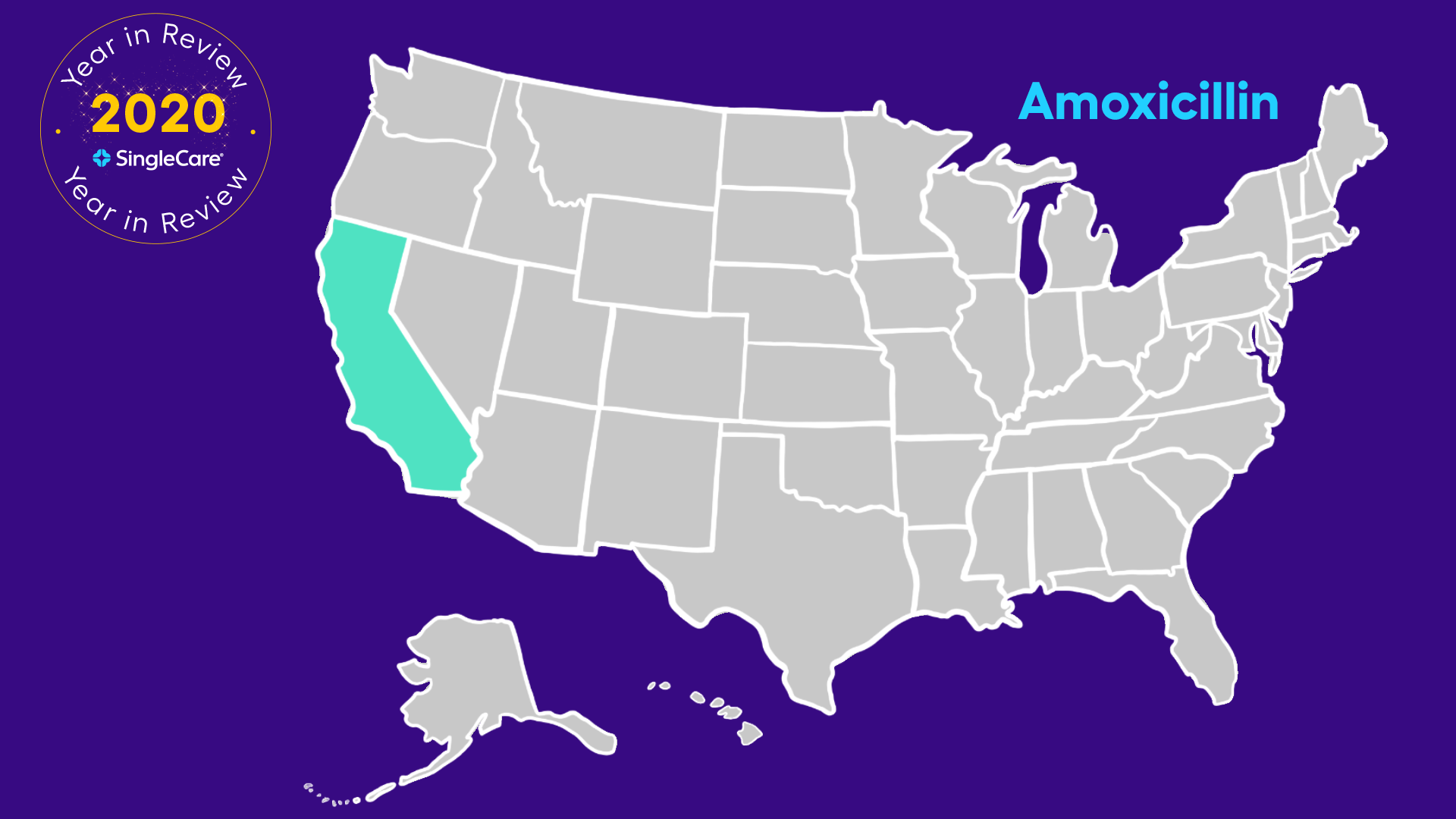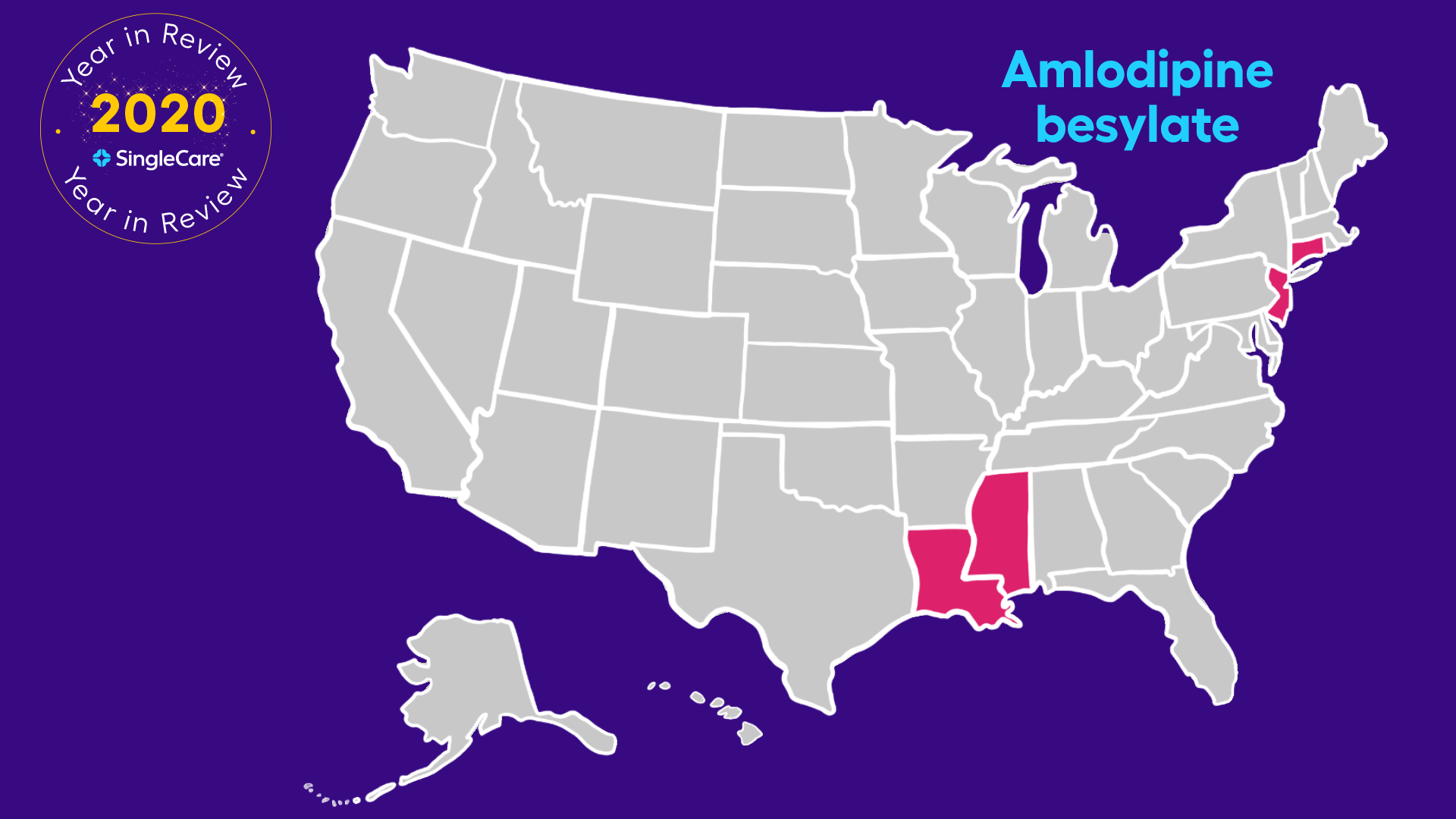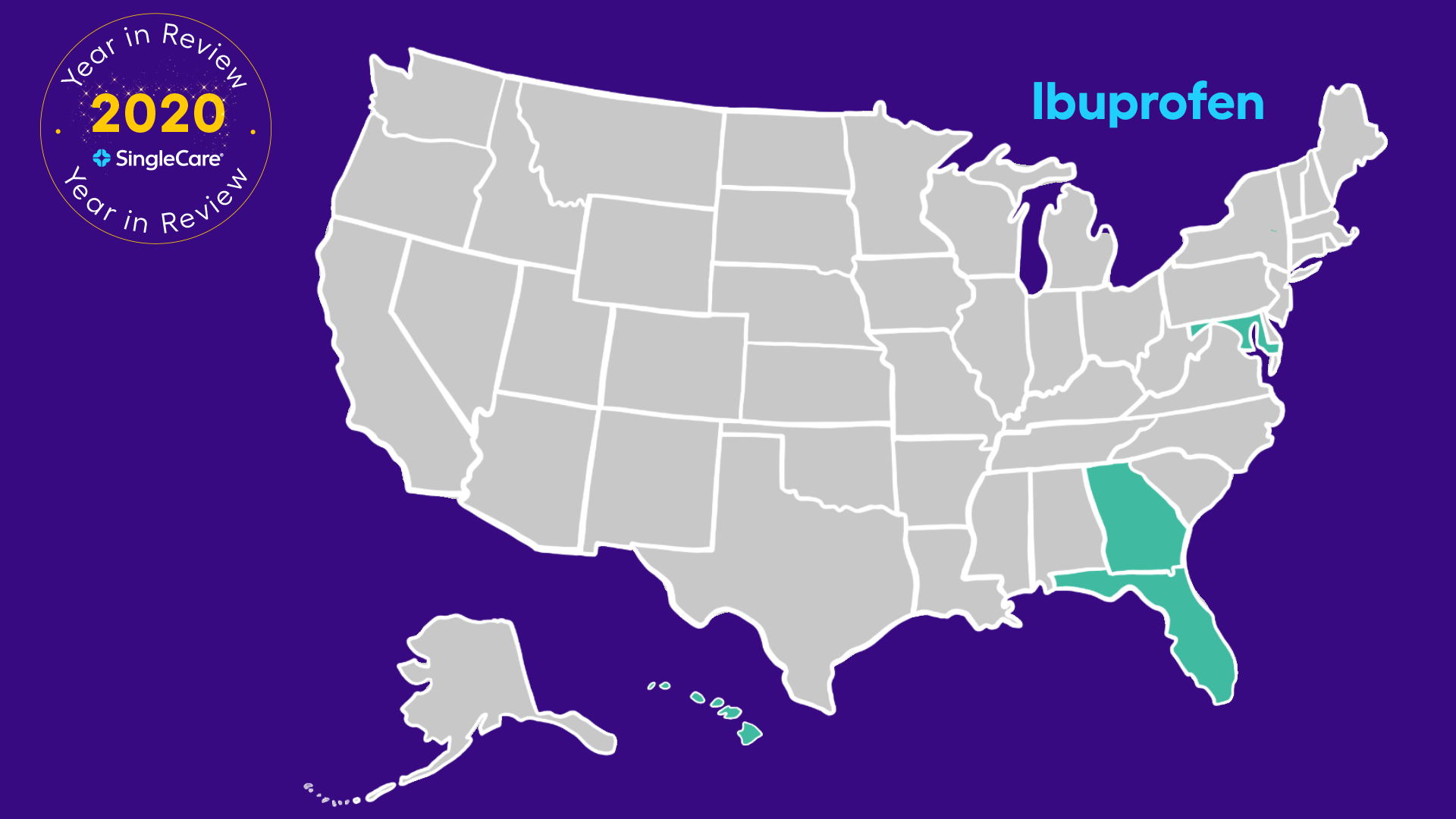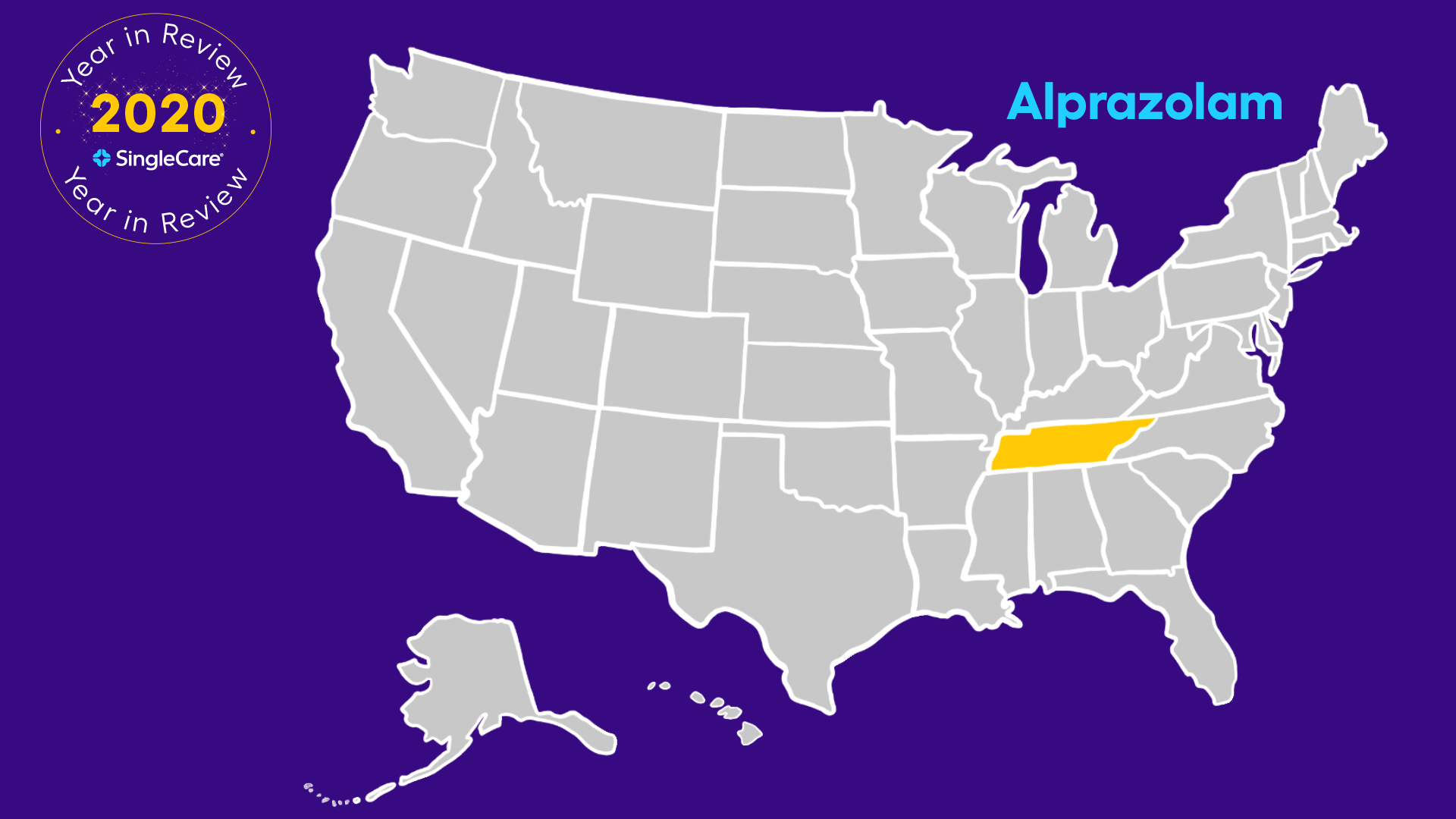Key takeaways
Lisinopril, a medication for high blood pressure, was the most prescribed drug in nearly half of the states in the U.S. in 2020.
Vitamin D prescriptions were most common in states with less sunshine or access to fresh produce, indicating a widespread deficiency.
Levothyroxine sodium, used to treat hypothyroidism, topped the prescription lists in Arizona and Colorado.
Amoxicillin, despite being over-prescribed, remained a highly prescribed antibiotic in California.
At first glance, Alaska and New Mexico might not appear to have much in common. Yet, they share the same most prescribed drug. Why? While many things have changed in 2020, one thing that hasn’t is people’s need for prescription medications.
Throughout the year, SingleCare continued to provide discounts on the prescriptions that people need, whether that be for seasonal allergies in highly allergenic areas or heart medications for chronic conditions. SingleCare researchers analyzed our prescription data for 2020 and found the most filled medication in every state.
So what’s the most popular medication where you live? And why? Read on to find out.
Most common prescription drugs by state:
- Lisinopril (Prinivil/Zestril)
- Vitamin D
- Levothyroxine sodium (Synthroid)
- Amoxicillin (Amoxil)
- Amlodipine besylate (Norvasc)
- Ibuprofen (Motrin)
- Amphetamine/dextroamphetamine (Adderall)
- Alprazolam (Xanax)
Skip to state-by-state breakdown
1. Lisinopril (Prinivil)
Most prescribed drug in Alaska, Arkansas, Delaware, Iowa, Idaho, Illinois, Massachusetts, Minnesota, Missouri, Montana, North Carolina, Nebraska, New Hampshire, New Mexico, Nevada, Ohio, Oklahoma, Oregon, Texas, Virginia, Vermont, Washington, Wyoming
Lisinopril is a medication that treats high blood pressure (hypertension)—a common condition in the U.S. Nearly half of all adults live with it, according to the U.S. Centers for Disease Control and Prevention (CDC). And there’s anecdotal evidence that the COVID-19 pandemic (and the stress it brings) is driving those numbers even higher. That’s a lot of people who might need a lisinopril prescription, which could explain part of the reason it’s the most popular medication among SingleCare users in nearly half of the 50 states.
Medications like lisinopril (an ACE inhibitor) relax blood vessels and prevent narrowing, making it easier for the heart to pump blood through your veins. Because lisinopril is generic, inexpensive, and effective, it’s been widely prescribed for more than 20 years.
Additionally, “lisinopril has significant benefits in slowing kidney disease progression, especially in diabetics,” says Barry Gorlitsky, MD, nephrologist and author of the blog KidneyAide. It also decreases stress on the heart, reduces mortality for those with heart disease, and improves cardiac function. It is a first line anti-hypertensive recommended for patients young and old, recommended by multiple medical societies, including the American Heart Association.
“For all these reasons, lisinopril is king,” Dr. Gorlitsky says.
RELATED: Blood pressure medications and treatments
2. Vitamin D
Most prescribed drug in Alabama, Kentucky, New York, West Virginia
You absorb vitamin D naturally when you spend time in the sun, and it’s also in many of the foods you eat. But in certain areas with less sunshine or access to fresh produce, vitamin D levels can quickly fall below normal. Meaning, it may become a staple in your medicine cabinet.
Vitamin D deficiency is common, and it’s been linked to depression, chronic fatigue syndrome, obesity, diabetes, hypertension, fibromyalgia, and osteoporosis, among other things. For some, an over-the-counter supplement is enough. For a higher dosage, you may need a prescription.
“Vitamin D is most commonly prescribed in people who have an established deficiency and/or as part of a treatment plan to prevent or slow the progression of osteoporosis,” Dr. Emmel explains. It is most often prescribed to older patients, which may explain why it tops the list in West Virginia, which has the 3rd highest population of elderly citizens in the country.
With Vitamin D deficiency typically being linked to insufficient sun exposure, Dr. Emmel says it’s not surprising that it’s on the most popular list for New York, given the climate. He was a little more perplexed about the other states on this list, but considering vitamin D was the prescription to top the list in most states last year, there’s been a noticeable decline in its popularity in 2020. Perhaps that means more people were getting active outside this year as lock-down measures kept them from other social settings.
RELATED: How much vitamin D should I take?
3. Levothyroxine sodium (Synthroid)
Most prescribed drug in Arizona, Colorado
Get levothyroxine sodium coupon
Levothyroxine helps to bring thyroid hormone levels back to normal for people with an underactive thyroid (also known as hypothyroidism). It’s a common health problem in the U.S., affecting 5 in every 100 people across the country.
Symptoms include fatigue, weight gain, constipation, increased sensitivity to cold, thinning hair, and depression. The condition can come about naturally (sometimes as a result of aging). It can also be caused by an injury (such as a virus or radiation) to, or the removal of, the thyroid gland. Hypothyroidism is typically diagnosed when blood work reveals lower than normal thyroid levels.
Why is levothyroxine so popular in Arizona and Colorado? “This condition is more prevalent in women and people over the age of 60, so perhaps the demographics in those states explain that,” Dr. Emmel says. (Arizona does, in fact, have a higher percentage of women than men, and also ranks high in elderly population—but Colorado is known for neither.) “It is very common so it’s not surprising to see this medication near the top of most used prescriptions.”
Levothyroxine is also sometimes used to treat other thyroid disorders, such as thyroid cancer.
RELATED: 5 thyroid medication interactions
4. Amoxicillin (Amoxil)
Most prescribed drug in California
You have most likely heard of amoxicillin before—it’s one of the most popular antibiotics prescribed in the penicillin class. “It is used to treat bacterial infections,” Dr. Emmel says. When used correctly, it can be a powerful weapon against illnesses such as strep throat, bacterial ear infections, bacterial pneumonia, and respiratory infections.
“Unfortunately, [it is] also commonly used to treat illnesses that are likely caused by viruses,” Dr. Emmel says. And because amoxicillin doesn’t treat viral infections, that means it is over-prescribed.
One out of every three prescriptions for antibiotics are unnecessary, according to the CDC. Overuse of these drugs can lead to antimicrobial resistance, a condition that occurs when bacteria and viruses no longer respond to medications, making those infections harder to treat and potentially very dangerous.
But, awareness of it is growing in recent years. The fact that amoxicillin was the most popular Rx in seven states in 2019, but only one this year may be a sign that physicians are prescribing it less freely than they have in the past.
RELATED: What happens if you don’t finish antibiotics?
5. Amlodipine besylate (Norvasc)
Most prescribed drug in Connecticut, Louisiana, Mississippi, New Jersey
Get amlodipine besylate coupon
As a member of the class of medications known as calcium channel blockers (CCB), amlodipine besylate treats high blood pressure (hypertension) and angina (severe chest pains resulting from reduced blood supply to the heart).
“It is a relatively safe and very inexpensive medication,” Dr. Emmel says. “Much like lisinopril, the combination of use for a common condition, and its low cost, lead to very high utilization.”
High blood pressure is linked to an increased risk of strokes, heart attacks, and kidney problems, all of which medications in the CCB class help to prevent. Additionally, lisinopril was in the news this year as a potential risk for complications when infected with COVID-19. Though the research was inconclusive, and doctors recommended patients keep taking their ACE inhibitors, this concern may have led to a spike in popularity of alternate drugs—like amlodipine—in states hard hit by the virus, like Louisiana and New Jersey.
Reasons why one medication may be prescribed over another vary. Lisinopril is a better first line treatment for hypertension if a patient has diabetes, heart failure, and or a prior heart attack, according to Dr. Emmel. Meanwhile, amlodipine also helps to treat angina (most commonly caused by coronary artery disease), making it the more likely medication to be prescribed if a patient is struggling with that. It’s possible that the states where amlodipine is most popular have a higher incidence of angina.
RELATED: What are normal blood pressure levels?
6. Ibuprofen (Motrin)
Most prescribed drug in Florida, Georgia, Hawaii, Maryland
Most people have reached for an ibuprofen at some point in their lives. This nonsteroidal anti-inflammatory drug (NSAID) helps to reduce pain and inflammation. It treats headaches, muscle pains, fevers, and joint swelling, as well as a variety of other conditions. It can be purchased over the counter in lower doses.
Stronger doses of ibuprofen may be prescribed to patients experiencing chronic pain conditions, like arthritis and endometriosis. Ibuprofen 400 mg, 600 mg, and 800 mg are prescription strength. “Physicians may be prescribing this more often to prevent opioid usage,” says Joanna Lewis, Pharm.D., founder of The Pharmacists Guide.
Florida has the second highest population of elderly citizens, and Hawaii ranks 7th on that list—which may explain an uptick in this prescription in those states.
As an anti-inflammatory, Dr. Lewis says ibuprofen can be helpful for a lot of different ailments, noting it is also a common prescription given to people after childbirth.
RELATED: Ibuprofen dosages
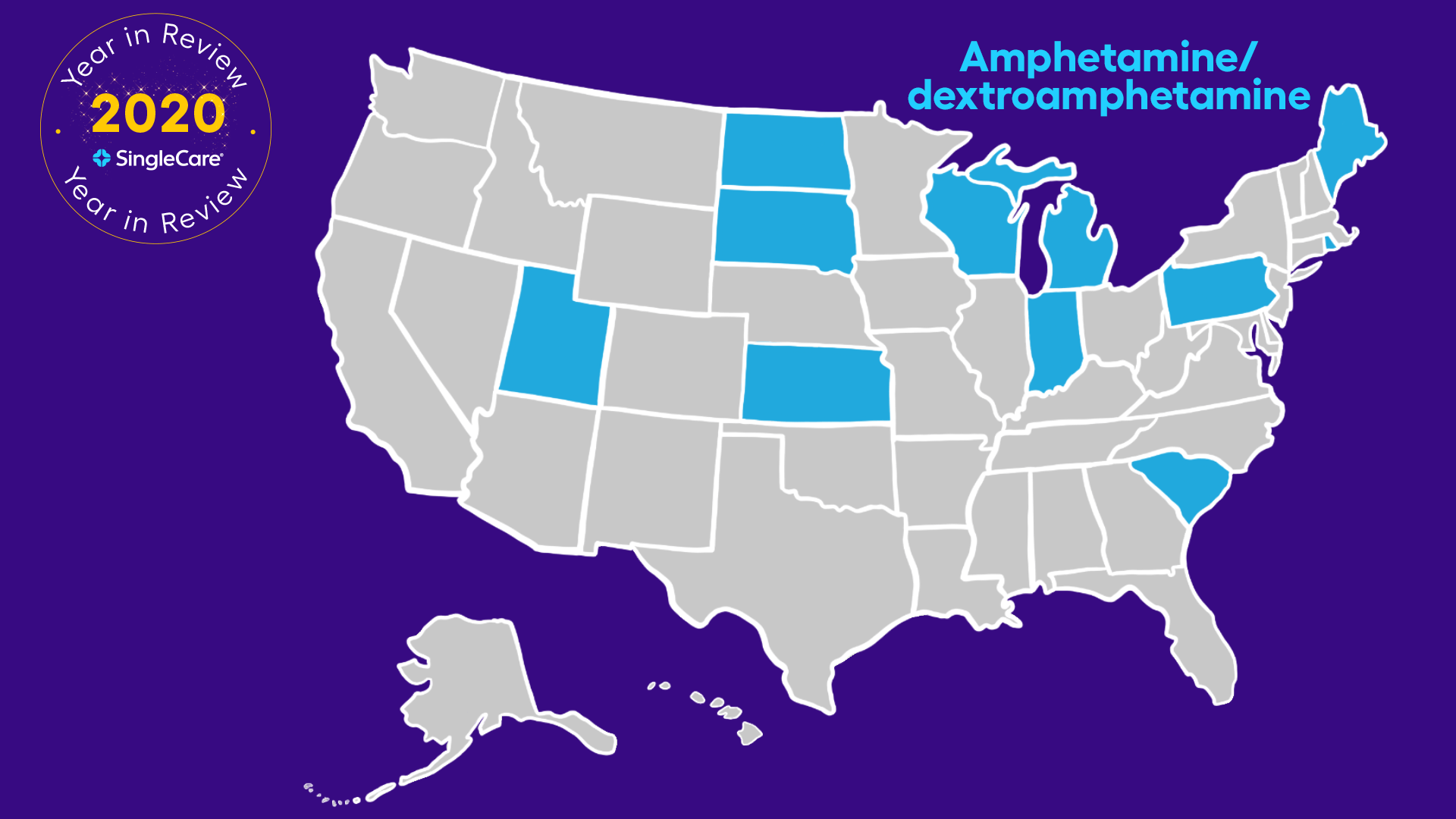
7. Amphetamine/dextroamphetamine (Adderall)
Most prescribed drug in Indiana, Kansas, Maine, Michigan, North Dakota, Pennsylvania, Rhode Island, South Carolina, South Dakota, Utah, Wisconsin
Get amphetamine/dextroamphetamine coupon
Amphetamine/dextroamphetamine is a stimulant medication used to treat attention deficit hyperactivity disorder (ADHD). “It is most commonly used in school-aged children and young adults, so demographics would certainly explain any disparities in its use across regions,” Dr. Emmel suggests. In fact, Indiana and South Carolina are among the top five states for ADHD diagnosis. And all but South Dakota and Utah have relatively high ADHD diagnosis rates, according to the CDC.
The medication is thought to decrease restlessness and improve concentration. It is most successful when used as part of a comprehensive treatment plan consisting of various therapies.
As a central nervous system stimulant, amphetamine/dextroamphetamine can also treat narcolepsy—a sleep disorder marked by chronic episodes of daytime fatigue and sudden, uncontrollable periods of sleep).
RELATED: ADHD treatments and medications
8. Alprazolam (Xanax)
Most prescribed drug in Tennessee
In April, reports began to circulate that anti-anxiety medications, like alprazolam, were surging in popularity—up 34%. Perhaps it’s no surprise then, that this medication reached the top of the list for one state this year. Particularly in Tennessee, which ranked as the state with the highest rates of depression earlier this year.
A member of the class of medications called benzodiazepines, alprazolam works by activating natural chemicals already in the body to induce a calming effect over the central nervous system.
As with most anti-anxiety medications, side effects of alprazolam are most commonly felt when first starting the medication and when going off of it. Withdrawal symptoms can be experienced when quitting alprazolam cold turkey. For this reason, patients should work with their doctors to lower their dose slowly if they decide to stop taking this medication.
RELATED: 62% of Americans experience anxiety, according to new survey
Most prescribed drugs in every state
- Alaska: Lisinopril
- Alabama: Vitamin D
- Arkansas: Lisinopril
- Arizona: Levothyroxine sodium
- California: Amoxicillin
- Colorado: Levothyroxine sodium
- Connecticut: Amlodipine besylate
- Delaware: Lisinopril
- Florida: Ibuprofen
- Georgia: Ibuprofen
- Hawaii: Ibuprofen
- Iowa: Lisinopril
- Idaho: Lisinopril
- Illinois: Lisinopril
- Indiana: Amphetamine/dextroamphetamine
- Kansas: Amphetamine/dextroamphetamine
- Kentucky: Vitamin D
- Louisiana: Amlodipine besylate
- Massachusetts: Lisinopril
- Maryland: Ibuprofen
- Maine: Amphetamine/dextroamphetamine
- Michigan: Amphetamine/dextroamphetamine
- Minnesota: Lisinopril
- Missouri: Lisinopril
- Mississippi: Amlodipine besylate
- Montana: Lisinopril
- North Carolina: Lisinopril
- North Dakota: Amphetamine/dextroamphetamine
- Nebraska: Lisinopril
- New Hampshire: Lisinopril
- New Jersey: Amlodipine besylate
- New Mexico: Lisinopril
- Nevada: Lisinopril
- New York: Vitamin D
- Ohio: Lisinopril
- Oklahoma: Lisinopril
- Oregon: Lisinopril
- Pennsylvania: Amphetamine/dextroamphetamine
- Rhode Island: Amphetamine/dextroamphetamine
- South Carolina: Amphetamine/dextroamphetamine
- South Dakota: Amphetamine/dextroamphetamine
- Tennessee: Alprazolam
- Texas: Lisinopril
- Utah: Amphetamine/dextroamphetamine
- Virginia: Lisinopril
- Vermont: Lisinopril
- Washington: Lisinopril
- Wisconsin: Amphetamine/dextroamphetamine
- West Virginia: Vitamin D
- Wyoming: Lisinopril
Popular prescription drug information reflects the scripts most filled through SingleCare from Jan. 1, 2020 through Oct. 31, 2020, excluding opioids and weight-loss drugs.




